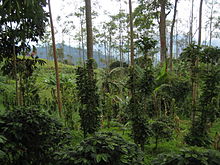Our website is made possible by displaying online advertisements to our visitors.
Please consider supporting us by disabling your ad blocker.
Sustainable agriculture

Sustainable agriculture is farming in sustainable ways meeting society's present food and textile needs, without compromising the ability for current or future generations to meet their needs.[1] It can be based on an understanding of ecosystem services. There are many methods to increase the sustainability of agriculture. When developing agriculture within sustainable food systems, it is important to develop flexible business processes and farming practices.[2] Agriculture has an enormous environmental footprint, playing a significant role in causing climate change (food systems are responsible for one third of the anthropogenic greenhouse gas emissions),[3][4] water scarcity, water pollution, land degradation, deforestation and other processes;[5] it is simultaneously causing environmental changes and being impacted by these changes.[6] Sustainable agriculture consists of environment friendly methods of farming that allow the production of crops or livestock without causing damage to human or natural systems. It involves preventing adverse effects on soil, water, biodiversity, and surrounding or downstream resources, as well as to those working or living on the farm or in neighboring areas. Elements of sustainable agriculture can include permaculture, agroforestry, mixed farming, multiple cropping, and crop rotation.[7]
Developing sustainable food systems contributes to the sustainability of the human population. For example, one of the best ways to mitigate climate change is to create sustainable food systems based on sustainable agriculture. Sustainable agriculture provides a potential solution to enable agricultural systems to feed a growing population within the changing environmental conditions.[6] Besides sustainable farming practices, dietary shifts to sustainable diets are an intertwined way to substantially reduce environmental impacts.[8][9][10][11] Numerous sustainability standards and certification systems exist, including organic certification, Rainforest Alliance, Fair Trade, UTZ Certified, GlobalGAP, Bird Friendly, and the Common Code for the Coffee Community (4C).[12]
- ^ "What is sustainable agriculture | Agricultural Sustainability Institute". asi.ucdavis.edu. 11 December 2018. Retrieved 2019-01-20.
- ^ "Introduction to Sustainable Agriculture". Ontario Ministry of Agriculture, Food and Rural Affairs. 2016. Retrieved 10 October 2019.
- ^ "FAO – News Article: Food systems account for more than one third of global greenhouse gas emissions". www.fao.org. Archived from the original on 30 September 2023. Retrieved 22 April 2021.
- ^ Crippa, M.; Solazzo, E.; Guizzardi, D.; Monforti-Ferrario, F.; Tubiello, F. N.; Leip, A. (March 2021). "Food systems are responsible for a third of global anthropogenic GHG emissions". Nature Food. 2 (3): 198–209. doi:10.1038/s43016-021-00225-9. ISSN 2662-1355. PMID 37117443.
- ^ Brown, L. R. (2012). World on the Edge. Earth Policy Institute. Norton. ISBN 978-1-136-54075-2.[page needed]
- ^ a b Rockström, Johan; Williams, John; Daily, Gretchen; Noble, Andrew; Matthews, Nathanial; Gordon, Line; Wetterstrand, Hanna; DeClerck, Fabrice; Shah, Mihir (2016-05-13). "Sustainable intensification of agriculture for human prosperity and global sustainability". Ambio. 46 (1): 4–17. doi:10.1007/s13280-016-0793-6. PMC 5226894. PMID 27405653.
- ^ Ben Falk, The resilient farm and homestead: An innovative permaculture and whole systems design approach. Chelsea Green, 2013. pp. 61–78.
- ^ "Shifting to Sustainable Diets". United Nations. Retrieved 26 April 2022.
- ^ Rose, Donald; Heller, Martin C.; Roberto, Christina A. (1 January 2019). "Position of the Society for Nutrition Education and Behavior: The Importance of Including Environmental Sustainability in Dietary Guidance". Journal of Nutrition Education and Behavior. 51 (1): 3–15.e1. doi:10.1016/j.jneb.2018.07.006. ISSN 1499-4046. PMC 6326035. PMID 30635107.
- ^ Meybeck, Alexandre; Gitz, Vincent (February 2017). "Sustainable diets within sustainable food systems". Proceedings of the Nutrition Society. 76 (1): 1–11. doi:10.1017/S0029665116000653. ISSN 0029-6651. PMID 28195528. S2CID 12459197.
- ^ Sun, Zhongxiao; Scherer, Laura; Tukker, Arnold; Spawn-Lee, Seth A.; Bruckner, Martin; Gibbs, Holly K.; Behrens, Paul (January 2022). "Dietary change in high-income nations alone can lead to substantial double climate dividend". Nature Food. 3 (1): 29–37. doi:10.1038/s43016-021-00431-5. ISSN 2662-1355. PMID 37118487. S2CID 245867412.
- ^ "Sustainable agriculture for a better world".
Previous Page Next Page


